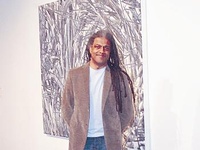“I knew he was going to be at Princeton before I agreed,” says Mitchell. “It wasn’t like I was like, ‘Wait a second! This isn’t a Boston number!’ He can be found.”
In an interview with The Crimson last Tuesday, Gates expressed a desire for Mitchell to return to teach after the spring, though the current arrangement is for a semester.
“That’s news to me, actually,” says Mitchell, slightly taken aback. “I mean, this is just something for me to try out. I don’t have any plans beyond this semester.”
RENAISSANCE MAN
Agreeing to teach without taking a leave from the New York Times and continuing his radio appearances means an inevitably frantic schedule. Mitchell is matter of fact about the plan. “I’ve always found that the busier you are, the more able you are to portion your time to get things done. But I’m sure that’s old news to you Harvard people,” he says.
For him, the attraction of Harvard lay also in the opportunity to talk about film irrespective of commerce.
“One of the things I’ve learned the hard way at the New York Times is that people want to know if they should go see a movie or not,” he says. “They don’t necessarily want the philosophical explication of how this movie fits into the pantheon or whether or not it’s canonical. They want to know if they should spend 10 bucks.”
After the deal was closed, Mitchell brought several ideas for classes to Gates, who consulted Kenan Professor of English and VES department chair Marjorie Garber. They decided together on the lecture and the seminar.
“I wanted to make these classes as much about a dialogue with students as possible,” says Mitchell. “I feel like I want to get something out of it too. If I want to hear my own voice, I can turn on NPR or pick up the paper.”
Mitchell says that screening films in advance, without an audience, means he often feels cut off from the public. “There’s an insularity in film criticism,” he says. “And I want to know what’s going on. By going out to festivals and teaching these classes, the calcification process is being retarded.” He pauses. “I hope.”
Mitchell says he was drawn to film writing in the first place by the underground film movement of 1960s and later blaxploitation films. He remembers reading reviews in high school of Caddyshack and complaining that the critics who decried the film had all missed the point. “I’ve always wanted a chance to write about culture in a way that wasn’t being done for me coming up,” he says. “I just felt like that perspective wasn’t being represented anywhere. It kind of is now, everywhere, I’m probably too late for the party.”
He wasn’t too late for the newspaper of record. When then-chief film critic Janet Maslin retired in 1999, the Times opted to replace her with a triumvirate of critics that includes Mitchell, Scott and Stephen Holden.
“There was an understanding that they wanted things to start changing,” Mitchell recalls. “They wanted people there who were interested in what was happening in the culture, who could take the pulse and put that in the paper. The New York Times no longer pretends that we are the last bastion of mid-seventies thinking. We understand that people watch television and listen to these CDs, and go out, and don’t just go to theater all the time.”
RACE RELATIONS
Harvard’s African American studies department has been visibly bruised by the confrontation two years ago between former professor Cornel R. West ’74 and Harvard president Lawrence H. Summers that drew national attention for its racial dimensions. Mitchell arrives here from a newspaper that has suffered its own public scandals of late. When the young black reporter Jayson Blair was fired last year from the Times for fraud and plagiarism, it led not only to the resignation of the paper’s two top editors, but to outside accusations that Blair was affirmative action’s cautionary tale.














